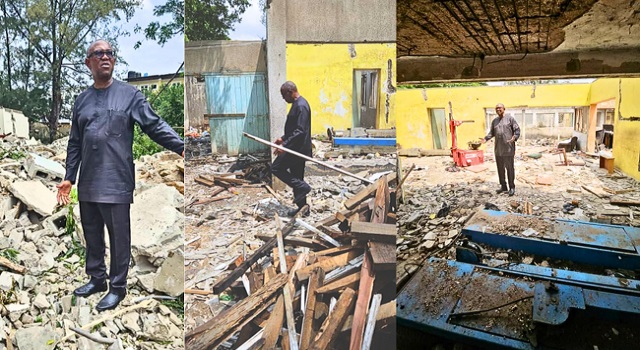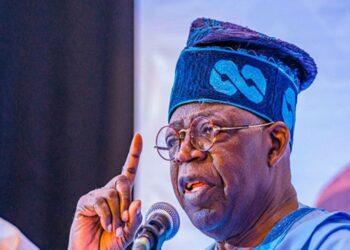By Sylvester I. Onwudiwe
In a country already gasping under the weight of economic sabotage, political recklessness, and systemic impunity, the recent demolition saga involving Mr. Peter Obi’s family in Lagos State reopens an old wound: Who truly owns Nigeria’s land — the people, or the powerful?
When news broke that a commercial property belonging to Peter Obi’s younger brother was flattened by bulldozers in broad daylight — allegedly without a court order, notice, or official seal — it jolted not just the Obidient camp but every Nigerian investor clinging to a fragile sense of security.
Obi himself narrated how he left Abuja to witness firsthand the “coordinated lawlessness” that unfolded in Ikeja. The property, according to him, was lawfully acquired over a decade ago, yet a demolition team — origin unclear — tore it down citing a vague judgment supposedly targeting “squatters.”
“No official could show us a court order. No notice was served. They arrived with brute force and vanished without accountability,” Obi lamented. This is not a village land tussle. This is Lagos — Nigeria’s commercial nerve centre, where property rights and investor confidence are supposed to be sacrosanct.
In a prompt response, the Lagos State Government, through its Commissioner Gbenga Omotoso and the Lagos State Building Control Agency, denied any involvement. They insist that no state agency authorised the demolition and that any illegal act will be investigated.
But herein lies the danger: If a private group can mobilise bulldozers to raze a legally purchased property in the heart of Lagos — without resistance, without accountability — then we have crossed the Rubicon of coordinated anarchy.
Court documents reveal that the land was bought in 2011, with the Governor’s Consent secured in 2013. The suspicious judgment that the demolition gang waved around was reportedly obtained in 2024 and targeted unnamed squatters — not Obi’s brother, Ndibe Obi, nor his registered company. Now, the victim has rushed to court seeking to set aside the suspect judgment, secure an injunction to halt further encroachment, and bring this shadowy operation into the light.
This is bigger than Peter Obi’s family. It is a test case for whether lawful title documents mean anything in modern Nigeria; whether the political climate allows for selective bulldozing, especially against perceived opposition voices; and whether the ordinary citizen can ever sleep peacefully, knowing tomorrow’s bulldozer may not care for your Certificate of Occupancy.
This is not the first time Lagos has faced allegations of weaponised demolition. Market traders in Alaba and Computer Village have cried foul. Waterfront communities have been erased overnight in the name of “development.” The urban poor are often displaced with no compensation and no plan for their resettlement. In all these cases, the bulldozer has become a blunt instrument in the hands of those who believe might makes right.
The Lagos State Government must produce clear evidence that this demolition was either lawful or stop hiding behind bureaucracy. The courts must assert their authority to protect landowners from rogue enforcers. Civil society must demand compensation where abuse has occurred and hold every complicit official to account.
To bulldoze a man’s property is to bulldoze his dignity. To bulldoze his dignity without notice or recourse is to bulldoze the rule of law. In a fragile economy fighting for every foreign dollar and local investor, Lagos — and by extension Nigeria — must decide: Will we be a place where your land is yours in fact, or just yours until someone stronger wants it?
May this matter not be buried under political spin. May the bulldozer’s echo become a rallying cry for true land justice.
**Sylvester I. Onwudiwe is a Senior Lawyer, Historian & Polygraph Practitioner










